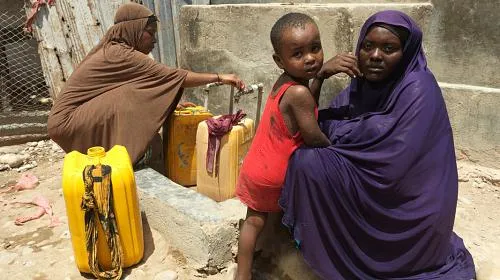Deteriorating drought, hunger and hygiene conditions in Somalia has put the health of 6.7 million people in need of humanitarian assistance at risk, with over 50,000 cases of suspected cholera reported. Although a famine declaration has been averted, water scarcity, food insecurity, continued access limitations and depressed rain forecasts suggest an elevated risk of the spread of water-borne diseases in Somalia.
“We are in the midst of a vicious cycle in which people move closer to urban centers, forming a new peri-urban poor, as they lose their livelihoods due to the drought, in search of food and water. Over 700,000 have ended up in displacement camps with very poor hygiene standards and contaminated water sources, reinforcing the existing risk of contracting acute watery diarrhea or cholera,” says Raheel Chaudhary, CARE Somalia Country Director.
The hunger crisis in Somalia is the worst the country has experienced in decades. After three consecutive years of failed rains, the current drought has resulted in over 600 deaths, most of them related to acute watery diarrhea or cholera. Particularly displaced women and children are suffering from the lack of sufficient hygiene measures, such as clean water and latrines.
“Women often condition themselves to wait until after dark to relieve themselves,” Elmi Abdi Nur, CARE Somalia’s Humanitarian Coordinator, says. “Open defecation not just puts women’s dignity and security at risk, it also poses a serious health hazard.”
CARE is supporting water, sanitation, hygiene and health efforts to prevent acute watery diarrhea and has so far reached over 250,000 people. Together with the Ministry of Health, it is scaling up information to the public on how to prevent acute watery diarrhea through using water from safe sources, treatment of water, keeping good hygiene and clean surroundings. CARE has also rehabilitated five water points, providing 10,000 individuals access to water, and distributed water purification tabs in regions hardest hit by recent drought and internal displacements.
“A very important aspect of our program is to work with women who are at heightened risk of sexual and gender based violence. We provide them with prevention and response mechanisms and offer counseling. Many of them are experiencing extreme levels of distress and do not dare to speak up when it is needed the most,” Raheel Chaudhary says.
CARE has been advocating for months that humanitarian actors have to scale up their levels of preparedness to try and curb another famine and cholera outbreak. In 2011, about 260,000 people starved to death in Somalia due to famine.
“Since 2011 we have heavily invested in building resilience among communities in particular strengthening water infrastructure, which have helped alleviate the level of suffering and deaths over the past three years of drought,” Raheel Chaudhary says. “With current crises far from over, we need to maintain the momentum with continued funding support for both lifesaving and early recovery interventions.”
Media Contact: Holly Frew, hfrew@care.org, +1.770.842.6188
About CARE: Founded in 1945, CARE is a leading humanitarian organization fighting global poverty. CARE has more than six decades of experience helping people prepare for disasters, providing lifesaving assistance when a crisis hits, and helping communities recover after the emergency has passed. CARE places special focus on women and children, who are often disproportionately affected by disasters. To learn more, visit www.care.org.

